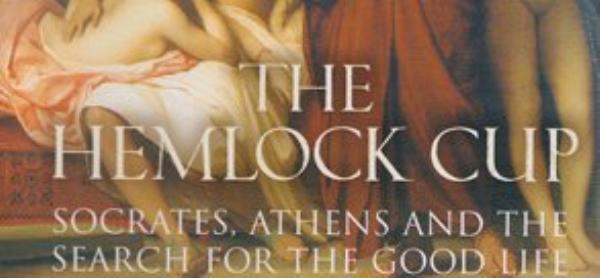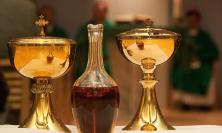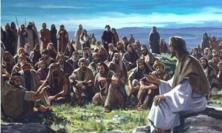Bettany Hughes is an historian specialising in Ancient Greece, an author and a popular broadcaster. In this biography of Socrates, Hughes blends her skills of scholarship, research and communication in an accessible and enticing style. For too long Socrates has been confined to the philosophy lecture and known outside of the classroom only for one or two sayings – ‘the unexamined life is not worth living’ – and for his death from poisoning for ‘corrupting the youth of Athens’. Bettany Hughes, however, takes us by the hand and leads us right into Socrates’ world, presenting to us the context for his 70-year life as a philosopher, conversationalist and soldier, and in particular for his trial.
The first page leads us straight into the early morning streets of Athens in the year 399 BC, where people are gathering in the Agora to see judgement passed on Socrates by a convened ‘citizens’ jury’. The Agora – the Greek word meaning ‘to gather together for trade and politics’, which, Hughes adds, gives its name to the word agoreuein; ‘to speak in public’ – is at the heart of fifth century BC Athens, a place in which to converse, to debate, to exchange ideas. The Agora in Socrates’ day was the place where musical recitals were held, soldiers drilled, books sold, dramas performed, sculptures shaped; speech writers sat at tables to scratch out words on papyrus and tree bark for lawyers and their clients; and administrators ,chosen by lot, met to standardise the business of democratic living. Fifth century BC Athens was the birthplace of ‘democracy’ – participation of all citizens (excluding women, children and slaves) in the running of the city and decisions about defence and war. As Socrates spelt out in detail, ‘carpenters, bronze workers, shoemakers, merchants, shop owners, rich and poor, lowly and noble born’ could all stand up and deliberate on the governance of the city.
Socrates himself took part in and was preoccupied with the thorubus, the Athenian word for ‘the buzz of opinion and dissent in the streets, the council chamber and the assembly’. This was an age of an information revolution, in a fast developing, literate city where all kinds of astonishing new ideas were abroad. Significantly, Pericles introduced a day payment for jurors, so that every man, even the poorest, could act as a judge. Socrates pointed out that as craftsmen and shopkeepers preferred not to give up a day’s business for a day payment, those who took to the deliberations in the square were often the poor, semi-skilled, war wounded and dispossessed, and professional ‘sophists’ who ‘glued together words’ to persuade their audiences for cash.
In his middle years, as the Athens treasury grew richer, Socrates himself had become poor. He became known for going barefoot and only possessing one cloak. He was dismissed as ‘a poverty stricken windbag who contemplates everything in the world but does not know where his next meal is coming from’. What really got him into trouble were his unorthodox views: ‘he shunned the material wealth that empire brought, his lines of communication to the gods were suspiciously direct. He fought for Athens but questioned whether military might was the greatest goal for man and whether battle brought good’. He criticised the ‘power of persuasive speech’ and insisted on a method of dialogue based on brief, challenging questions and answers. As Hughes puts it, ‘for Socrates the Athenian democracy was best served by dialogue not bombast’ (p. 170). He worried that the pursuit of plenty would bring mindless materialism, commenting as he passed the shops that they stocked what he did not need, and remarking that democracy would become just a banner under which to declare war and fight. As he walked through the Agora he asked what was the point of warships, city walls and glittering statues if ‘we are not happy’.
The whole war-broken city of Athens is described to us: we walk alongside the River Ilissos en route to the Kynosarges gymnasium; are taken down to the port of Piraeus where the trireme warships are built; and are introduced to all the main characters, including Pericles and Thucydides. Hughes’s scholarship enables her to reconstruct for us the Peloponnesian Wars (between Athens and rival Sparta) that dominated Socrates’s life in Athens, and the experience of the devastating Athens plague. Greek history is brought to life as she brings us with her on her journey into modern day Greece to explore the archaeological sites and museum evidence. ‘Rather than the picture-perfect elegance of hoplites on the black figure vases that litter the graves and archaeological layers of fifth century Greece, we should turn to the bone evidence of the period where eye sockets are pierced with arrows, shin bones sliced with axes, teeth smashed back into skulls’ (p. 222). This is researched history at its best, leaving you wanting to set off on an exploratory site-seeing tour to out-of-the-way, neglected places rather than heading for the beaches of popular islands.
The Hemlock Cup is a literary time machine and for history scholars there are over 150 pages of footnotes, maps and references for further research. Philosophy is embedded in a political, economic and social story focussed on one character’s life, written brilliantly in attractive, brief chapters. The Greek experiments with democracy still have much to teach us and Socrates can still act as an interpretative guide. It is unsurprising that the medieval theologians urged that the rediscovery of their texts be taken seriously.
The reviewer, John Battle is former Member of Parliament for Leeds West.






